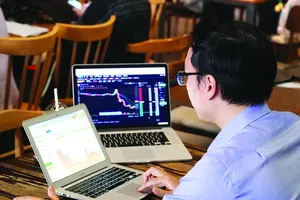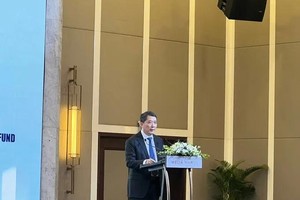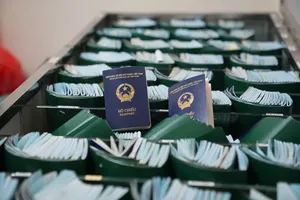
On September 19, Vietnam Thinh Vuong Tokenized Asset Exchange (CAEX) was established with an initial capital of VND25 billion (US$1 million), backed by VPBankS (11 percent), LynkiD (50 percent), and Future Land (39 percent). VPBankS is reportedly taking the lead, assembling a team of blockchain, finance, and cybersecurity experts.
This followed an announcement in August that Military Bank (MB) had partnered with Dunamu, the operator of the Upbit digital asset exchange in the Republic of Korea, to develop infrastructure and provide legal consulting.
The securities sector is also making moves. The VIX Tokenized Asset Exchange (VIXEX) was formed on August 26 with a charter capital of VND1 trillion ($40 million), with VIX Securities (15 percent) and FTG Vietnam (64.5 percent) as its main shareholders.
Meanwhile, HVA Investment (HVA Group) recently unveiled plans to raise capital and expand into the digital asset space. The group intends to invest in Onuschain, a domestic blockchain firm, to establish a digital asset exchange called DNEX with a target capitalization of around VND10 trillion ($400 million), to be raised from strategic investors.
But despite the growing number of players, there’s a catch. Initial reports indicate that most of these newly formed exchanges fall short of the minimum capital requirements stipulated by law.
The regulation demands a minimum charter capital of VND10 trillion ($400 million), with at least 65 percent contributed by institutional organizations and over 35 percent by financial institutions. Consequently, to date, no company has been granted a license to operate within the digital asset pilot program.
With a capital requirement three times that of a commercial bank, many believe this new arena will be the exclusive domain of the giants. A representative from VFS Securities commented that this high barrier to entry will reshape the domestic market, forcing smaller securities firms to pivot into providing auxiliary services like consulting and analysis within the ecosystems built by the major players.

Beyond capital, stringent requirements on business performance, governance, and technology also pose significant hurdles for smaller enterprises, especially startups. Only truly strong units, with comprehensive ecosystems and outstanding technological capabilities, are strong enough to participate. This is cited as a key reason why homegrown digital asset service providers like Coin98 Wallet and KyberSwap have already withdrawn from the market.
Most experts agree that Vietnam’s strategy of imposing strict controls from the outset is the correct approach for a pilot phase. Requiring domestic licenses, VND-denominated transactions, and substantial capital not only ensures financial stability but also acts as a “filter”, allowing only the most serious and well-resourced organizations to participate.
However, the biggest challenge may not be financial. According to Chairman Phan Duc Trung of the Vietnam Blockchain Association, it’s human resources. He pointed to the recent $1.5 billion hack of the Bybit exchange as a stark example.
“Despite high liquidity and heavy investment in security, the incident was caused by human error – someone simply omitted steps in an operational process”, he explained. “This is a basic form of attack that can happen to any organization, regardless of its security level.”
With tens of millions of Vietnamese already participating in the crypto market, often without basic knowledge, the risks are substantial. Chairman Phan Duc Trung stressed the urgent need to develop a workforce of well-trained professionals with practical experience, from regulatory bodies to market operators.
“If we don’t solve the human capital equation”, he warned, “even the most comprehensive legal framework will face immense challenges in its real-world implementation.”
Director Michael Kokalari of Macroeconomic Analysis, VinaCapital, commented that the Vietnamese government’s move to pilot a digital asset exchange and launch NDAChain, the national blockchain platform, is a strategic step. It helps to legalize transactions, increase tax revenues, and formally connect digital assets to Vietnam’s financial system.
If managed tightly, he stressed, this market could not only bring oversight to the currently unregulated transactions, estimated at over $100 billion annually, but also open up a vital new channel for raising capital for the digital economy. This will spur the process of tokenization in Vietnam, where familiar financial assets like bonds, fund certificates, and carbon credits, can be issued and traded as digital assets on regulated, bank-linked infrastructure.
Assoc Prof Dr Nguyen Huu Huan from HCMC University of Economics shared that Vietnam should design a more open playing field, where fintechs can participate under a transparent and controlled framework without being excessively constrained.
The tokenized asset market shouldn’t be limited to just trading; it must evolve into a comprehensive ecosystem. This includes DeFi (decentralized finance), peer-to-peer lending based on digital asset, and the tokenization of real estate and carbon credits, all supported by secure custody services to protect investors. Only such a diverse ecosystem can become a true launchpad for Vietnamese startups to compete on the global stage.
























